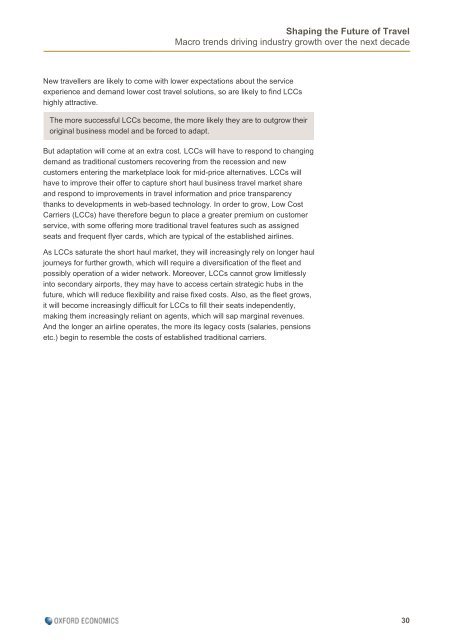Amadeus-Shaping-the-Future-of-Travel-MacroTrends-Report
Amadeus-Shaping-the-Future-of-Travel-MacroTrends-Report
Amadeus-Shaping-the-Future-of-Travel-MacroTrends-Report
You also want an ePaper? Increase the reach of your titles
YUMPU automatically turns print PDFs into web optimized ePapers that Google loves.
<strong>Shaping</strong> <strong>the</strong> <strong>Future</strong> <strong>of</strong> <strong>Travel</strong><br />
Macro trends driving industry growth over <strong>the</strong> next decade<br />
New travellers are likely to come with lower expectations about <strong>the</strong> service<br />
experience and demand lower cost travel solutions, so are likely to find LCCs<br />
highly attractive.<br />
The more successful LCCs become, <strong>the</strong> more likely <strong>the</strong>y are to outgrow <strong>the</strong>ir<br />
original business model and be forced to adapt.<br />
But adaptation will come at an extra cost. LCCs will have to respond to changing<br />
demand as traditional customers recovering from <strong>the</strong> recession and new<br />
customers entering <strong>the</strong> marketplace look for mid-price alternatives. LCCs will<br />
have to improve <strong>the</strong>ir <strong>of</strong>fer to capture short haul business travel market share<br />
and respond to improvements in travel information and price transparency<br />
thanks to developments in web-based technology. In order to grow, Low Cost<br />
Carriers (LCCs) have <strong>the</strong>refore begun to place a greater premium on customer<br />
service, with some <strong>of</strong>fering more traditional travel features such as assigned<br />
seats and frequent flyer cards, which are typical <strong>of</strong> <strong>the</strong> established airlines.<br />
As LCCs saturate <strong>the</strong> short haul market, <strong>the</strong>y will increasingly rely on longer haul<br />
journeys for fur<strong>the</strong>r growth, which will require a diversification <strong>of</strong> <strong>the</strong> fleet and<br />
possibly operation <strong>of</strong> a wider network. Moreover, LCCs cannot grow limitlessly<br />
into secondary airports, <strong>the</strong>y may have to access certain strategic hubs in <strong>the</strong><br />
future, which will reduce flexibility and raise fixed costs. Also, as <strong>the</strong> fleet grows,<br />
it will become increasingly difficult for LCCs to fill <strong>the</strong>ir seats independently,<br />
making <strong>the</strong>m increasingly reliant on agents, which will sap marginal revenues.<br />
And <strong>the</strong> longer an airline operates, <strong>the</strong> more its legacy costs (salaries, pensions<br />
etc.) begin to resemble <strong>the</strong> costs <strong>of</strong> established traditional carriers.<br />
30


